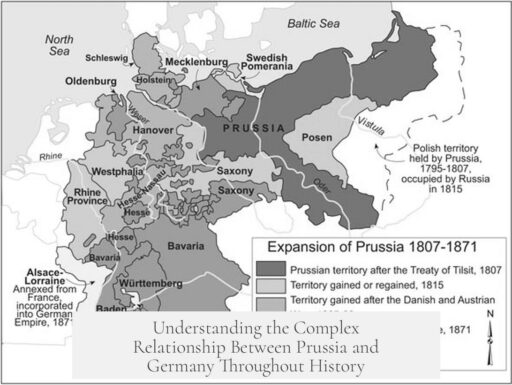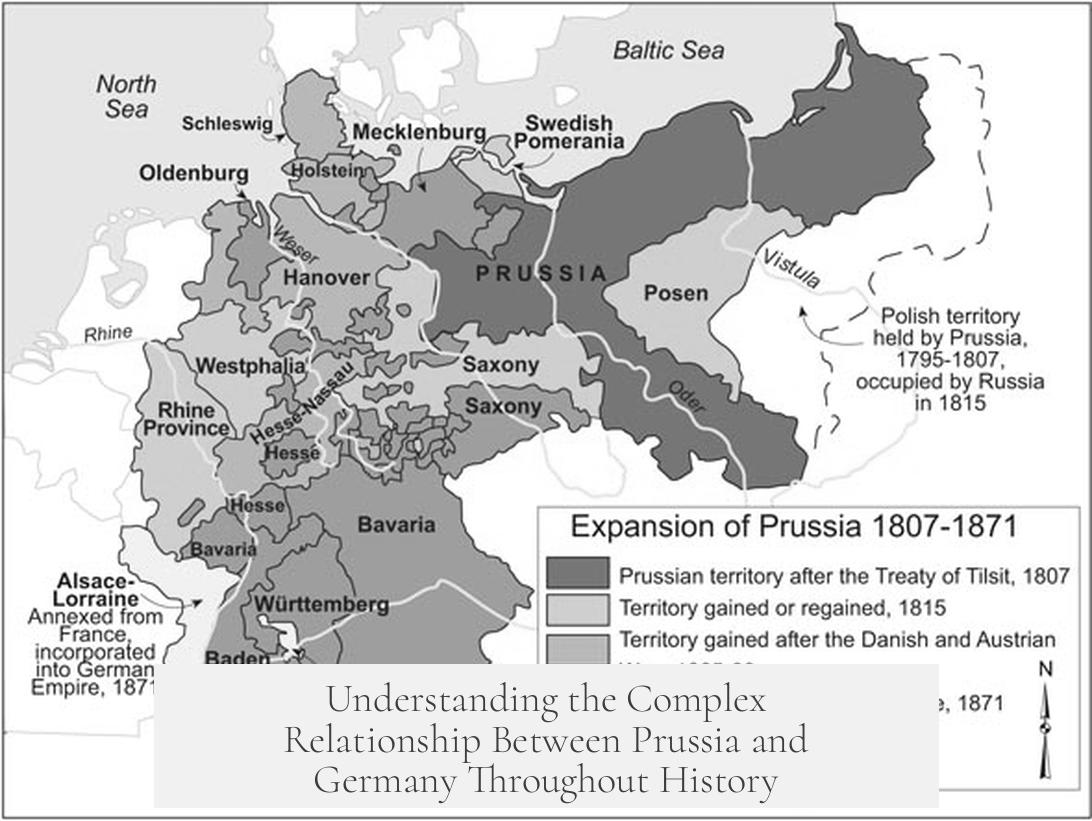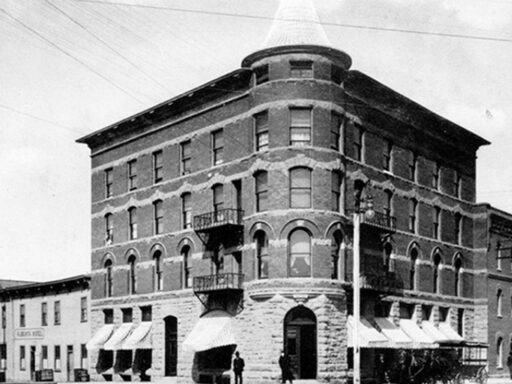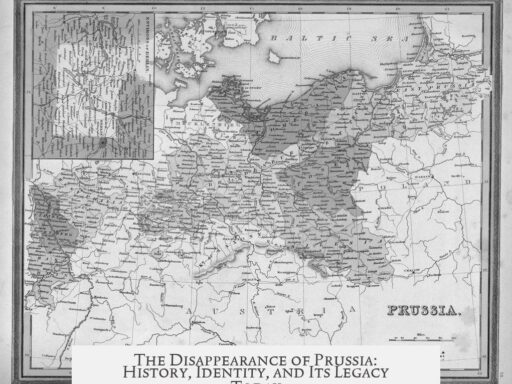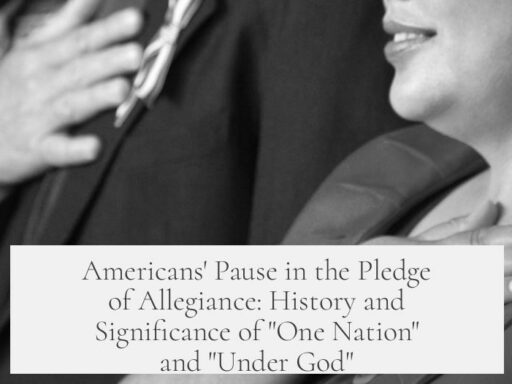The relationship between Prussia and Germany centers on Prussia’s dominant role in the formation, leadership, and political structure of the German state before, during, and after unification in 1871. Prussia was a powerful kingdom and a major German state that led the unification of many smaller German states into the German Empire. Its king became the German Emperor, and its political influence shaped the nature and governance of Germany until Prussia’s dissolution after World War II.
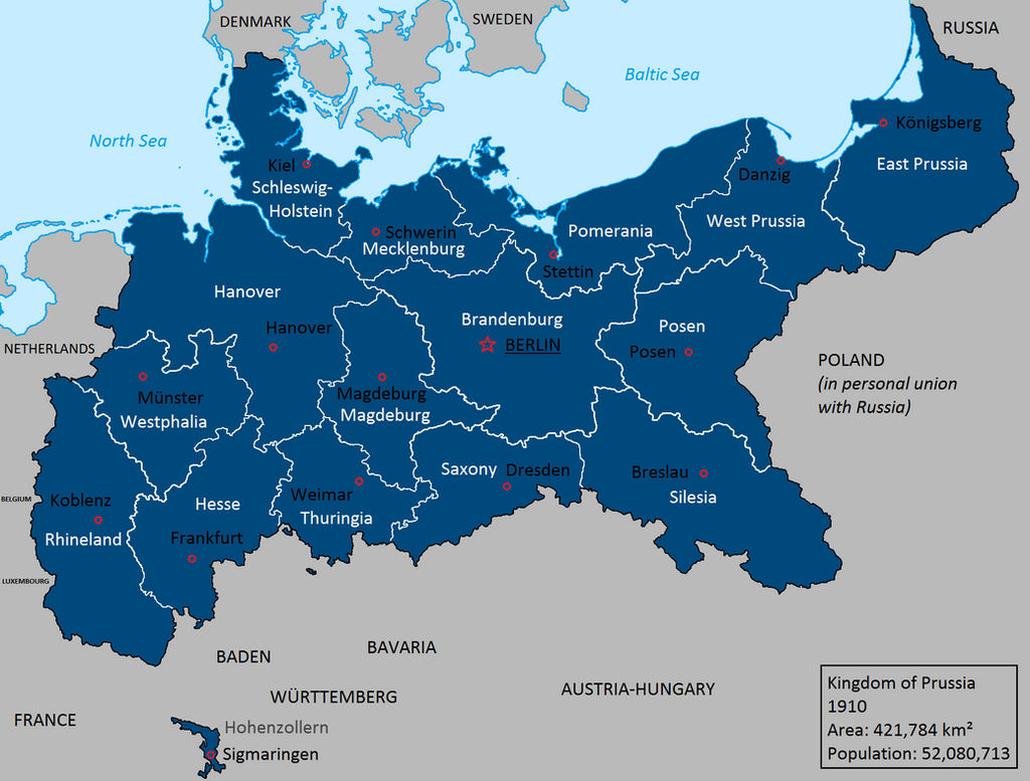
Before 1871, there was no unified German nation. What people called “Germany” was a collection of many independent kingdoms, principalities, duchies, free cities, and other territories within Central Europe. These entities shared German dialects but had separate governments and rulers. The overarching political framework was the Holy Roman Empire, a loose confederation that lasted until 1806.
Prussia emerged as a significant power within this framework through the Electorate of Brandenburg ruled by the Hohenzollern family. Brandenburg was part of the Holy Roman Empire, but its rulers also held the Duchy of Prussia, which was outside the empire. In the early 1700s, Elector Frederick III crowned himself King in Prussia as a reward for supporting Austria during the War of Spanish Succession. His successors later styled themselves as King of Prussia. This marked Prussia’s rise as a kingdom distinct from other German states.
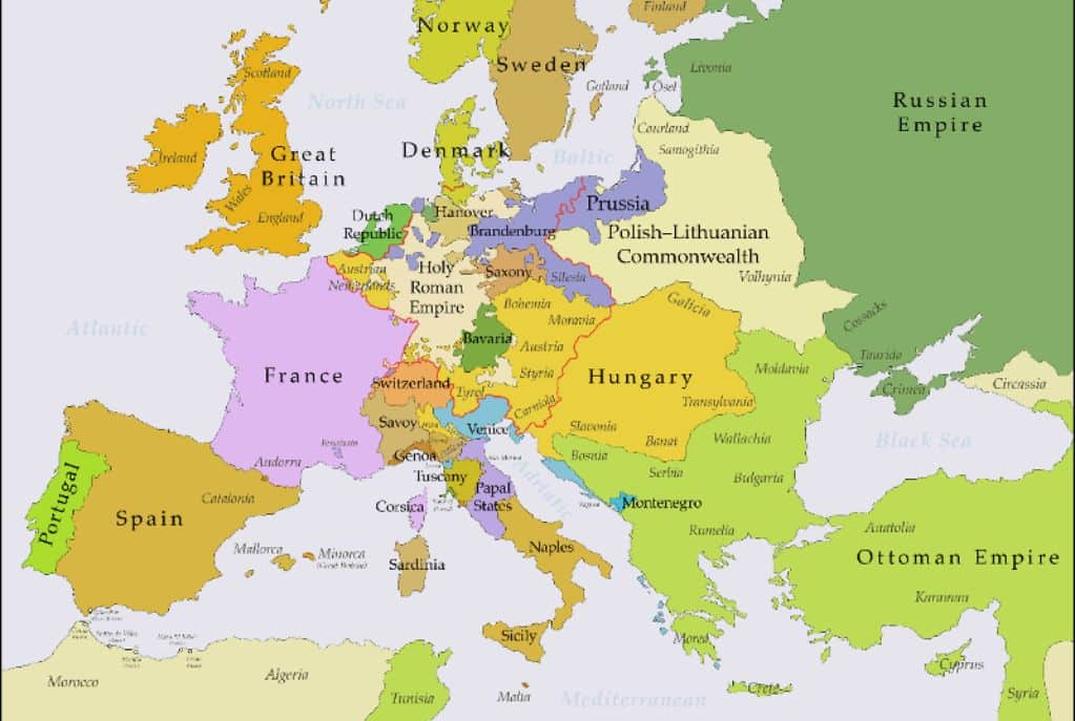
Following the dissolution of the Holy Roman Empire by Napoleon in 1806, Prussia survived and grew stronger through the Napoleonic Wars. By the mid-19th century, it was the most powerful German state. Otto von Bismarck, the Prussian chancellor, orchestrated a series of military conflicts between 1864 and 1871. These wars pressured smaller German states to unite under Prussian leadership, culminating in the proclamation of the German Empire in 1871 at the Palace of Versailles.
The German Empire was a federal system rather than a unitary state. It resembled the United States with various constituent states retaining some autonomy. Four German kingdoms existed within it: Prussia, Bavaria, Württemberg, and Saxony. However, Prussia was dominant. The emperor of Germany was the King of Prussia. In the Bundesrat, Germany’s federal council, Prussia held 17 votes, more than enough to block legislation. This gave Prussia outsized influence over German affairs.
Prussia’s militaristic culture and political power shaped Germany, especially visible in its role in the two world wars. Prussian leadership influenced national policies, military strategies, and internal German relations. During World War I, some German soldiers distinguished themselves by regional identity, highlighting tensions and pride among German states. The negative perception of Prussian militarism grew strong, particularly after World War II.
After World War I, during the Weimar Republic, Prussia became a center of democracy and left-wing politics, partly due to its industrial areas like Berlin and the Ruhr. Nazi Germany later sought to diminish Prussia’s significance. Adolf Hitler saw unification under Bismarck as too limited and promoted a broader pan-German empire concept. Although Nazi propaganda invoked some Prussian military heroes, the regime restructured internal governance, reducing Prussia’s official standing. Hitler appointed Hermann Göring as Minister President of Prussia to control the region strategically.
Following World War II, the Allies formally abolished Prussia in 1947. They viewed it as a symbol of German militarism and aggression linked to the conflicts of the 19th and 20th centuries. Much of what was historically known as Old Prussia—territories outside the Holy Roman Empire—was assigned to post-war Poland. This marked the end of Prussia as a political entity.
Historically, the name “Prussia” traces back to Baltic-Slavic peoples known as the Pruss, conquered and Christianized by the Teutonic Order starting in the 13th century. The Teutonic Knights established a rigid hierarchical society, with themselves at the top, followed by German settlers, with Slavic and Baltic peoples ranked lowest. Despite defeats like the 1410 Battle of Grunwald, the region prospered economically and socially, contributing to what some call the “Prussian myth”—a legacy of order, efficiency, and military discipline.
During German unification and the empire period, Prussia functioned much like a U.S. state such as California or Texas, but with more power and influence over the entire country. While it was one of many states within the German Empire, its king doubled as emperor, and its political control often outweighed that of other regions.
| Aspect | Details |
|---|---|
| Pre-1871 Germany | Many independent German-speaking states within the Holy Roman Empire framework |
| Prussia’s Status | Kingdom led by Hohenzollern family, dominant in military and politics |
| German Unification | Bismarck-led wars led smaller states to unify under Prussia (1871) |
| German Empire Structure | Federal system with Prussian King as German Emperor and dominant federal vote |
| 20th Century Role | Prussia linked to German militarism; dissolved by Allies after WWII |
- Before 1871, Germany was a collection of many independent German-speaking states within the Holy Roman Empire.
- Prussia rose as a key kingdom, led by the Hohenzollerns, with growing military and political influence.
- Otto von Bismarck orchestrated German unification under Prussia’s leadership, creating a federal empire in 1871.
- Prussia held dominant power in the German Empire, with its king serving as emperor and controlling the Bundesrat vote balance.
- Prussia became synonymous with German militarism, influencing both world wars and internal politics until its abolition in 1947.
Can Someone Please Explain the Prussia/Germany Relationship?
If you ever wonder how Prussia relates to Germany, here’s the lowdown: Prussia was not just a part of Germany; it was the powerhouse shaping Germany’s rise as a unified nation. It’s like California in the USA but with a blend of royal kings, wars, and a dash of stubborn military spirit.
Let’s break it down. Before 1871, ‘Germany’ was not what you picture today—a single country. Instead, imagine a jigsaw puzzle of many small kingdoms, duchies, free cities, and principalities, all connected loosely by language and culture. This was the central European scene, framed politically by the Holy Roman Empire until 1806.
Prussia stood out from this crowd. It started as a territory outside the Holy Roman Empire but closely linked to one of its key states, the Electorate of Brandenburg. The Hohenzollern family controlled both these places. In fact, Frederick III, the Elector of Brandenburg, crowned himself King in Prussia, a clever move that elevated his status. His descendants then proudly styled themselves as King of Prussia.
The Rise of Prussia: From Background Player to Leading Actor
When Napoleon dissolved the Holy Roman Empire in 1806, the European political scene scrambled. Yet, Prussia emerged stronger after the Napoleonic Wars, unlike many states weakened or erased. Then came Otto von Bismarck—no history class is complete without him—who masterminded a series of wars (1864 to 1871). These conflicts weren’t just about battles; they were strategic acts forcing smaller German states to unite under Prussia’s rule.
This culminated in the creation of the German Empire in 1871. But the new empire wasn’t a monolith like France or the UK. Germany became a federal system, resembling the USA with its states having certain rights and autonomy. Think of it as a federation with many kings—yes, kings! Four kings ruled within the empire: Prussia, Bavaria, Württemberg, and Saxony. The catch? The King of Prussia also wore the crown of the German Emperor, or Kaiser, making Prussia the dominant player politically and militarily.
Prussia’s Clout Within the German Empire
Prussia’s power wasn’t symbolic alone. The constitution ensured the King of Prussia was the Kaiser. Prussia’s representatives held 17 votes in the Bundesrat, Germany’s federal council, enough to veto any bill if they wished. This strong influence shaped not only the government but also the empire’s military and foreign policies.
Did you know that during World War I, Bavarians and others placed signs in their trenches identifying themselves—and joked about the timing of when Prussian troops would arrive? This shows how Prussia’s militaristic reputation was deeply ingrained, a perception carried into both world wars, where Prussia often was seen as the driving force behind Germany’s military aggressiveness.
The Lighter and Darker Sides of Prussian Legacy
Prussia’s history isn’t just about soldiers and kings. Going way back, the name “Prussia” originally referred to the lands of the Pruss, Baltic-Slavic pagans who lived until the 12th century. Then came the Teutonic Knights, a Germanic crusading order invited by Polish Duke Conrad of Masovia in 1228 to conquer and Christianize the region. The knights set up a strict hierarchy, placing themselves at the top, Germans in the middle, and the native Slavs and Pruss at the bottom.
After a significant defeat at the Battle of Grunwald in 1410, the Teutonic Order transitioned into a sort of feudal state. Interestingly, this era laid the foundation for what some call the ‘Prussian myth’—the idea of a disciplined, prosperous, orderly society that many people admired or envied during the early modern era.
People living in other German regions during the 30 Years War noticed how wealthy and orderly Prussia appeared compared to their war-torn lands. Prussia’s reputation for good work ethic and order was something quite distinct from the chaos elsewhere.
Prussia’s Role Through Weimar and Nazi Germany
One might think Prussia’s militaristic legacy ended with the monarchy, but it played interesting roles afterward. Contrary to its pre-war authoritarian image, during the Weimar Republic (1919-1933), Prussia was actually a pillar of democracy. ‘Red Berlin’ and the Ruhr industrial area ensured left-wing political dominance. Not the tough militaristic Prussia you might expect.
However, during Nazi Germany, things shifted. Hitler didn’t like to emphasize Prussian history too much, probably because it reminded people of states and rulers other than himself. The Nazi Reichsgau system minimized Prussia’s importance, only mentioning its ancient boundaries in East and West Prussia.
Still, Nazi propaganda cleverly connected to Prussia’s militaristic spirit by portraying Frederick the Great as a parallel to Hitler. But Nazi Germany had bigger dreams: uniting not just Germans, but wide swaths of Europe into a continent-spanning empire. Hitler even appointed Hermann Göring as Minister President of Prussia to control the region strategically.
Prussia’s Post-War Fate: A Vanished Giant
After World War II, the Allies effectively abolished Prussia. Why? Prussia came to symbolize military aggression and authoritarianism. Most of Old Prussia’s territory—outside the Holy Roman Empire—became part of Poland. So, unlike many other historical regions, Prussia vanished officially, leaving only memories and its influence behind in modern Germany.
But don’t mistake that as a disappearance of cultural legacy. Prussian values—order, discipline, and a certain work ethic—still echo in parts of German culture today.
So, What’s the Bottom Line? Understanding Prussia and Germany
Think of Prussia as a powerful state within Germany, much like California or Texas in the U.S. But unlike most states, Prussia’s role was outsized. It was the engine behind German unification, a heavyweight in politics, militarism, and culture. It shaped how Germany moved through the 19th and early 20th century, how it fought its wars, and how it was governed.
Now, imagine the German Empire as a federation with many states, each with their own rulers. But the King of Prussia was the top dog, the Kaiser, with enough votes, armies, and influence to steer the whole ship. This unique relationship made Prussia a key player in Germany’s story, from medieval times through to the dramatic 20th century.
Let’s Wrap It With Some Fun Food for Thought
- If Prussia was so powerful, why did it disappear? Sometimes, history isn’t about survival but about the legacy left behind—and Prussia definitely left a big one.
- Why was the King of Prussia also the German Emperor? Because Prussia was the biggest state with the strongest army—the Hohenzollerns claimed the honor.
- Did Prussian soldiers really cause other Germans to worry? During WWI, yes, some soldiers joked about the arrival of Prussian troops, who were renowned (and feared) for their discipline.
Understanding Prussia’s role helps you see Germany as less of a monolithic blob, more of a complex, multi-part story where one state wielded exceptional power, both shaping and defining the nation for centuries.
So, the next time someone asks about the Prussia/Germany connection, you’ll know it wasn’t just a simple membership. It was a bond of dominance, politics, culture, and history that built modern Germany from a complex web of states. The tale of Prussia is the tale of Germany’s rise.
What was Prussia’s role before the German Empire was formed in 1871?
Before 1871, Germany was a collection of states. Prussia was one of the strongest among them. It started as the Electorate of Brandenburg and the Duchy of Prussia, ruled by the Hohenzollern family.
How did Prussia influence the unification of Germany?
Prussia led wars from 1864 to 1871 to unite various German states. Otto von Bismarck, the Prussian chancellor, orchestrated this. After unification, the King of Prussia became the German Emperor.
Why was Prussia so powerful within the German Empire?
Prussia held the largest share of votes in the Bundesrat and its king was the German Kaiser. It could veto laws and had significant political control over the federal system of the empire.
How did Prussia impact Germany during the World Wars?
Prussia was seen as leading German militarism. During WWI, some German soldiers distanced themselves from Prussians. Its military tradition shaped Germany’s stance in both World Wars.
What happened to Prussia after World War II?
The Allies abolished Prussia after WWII. Most of its territory, especially “Old Prussia,” was given to Poland. This marked the end of Prussia as a political entity in Germany.
